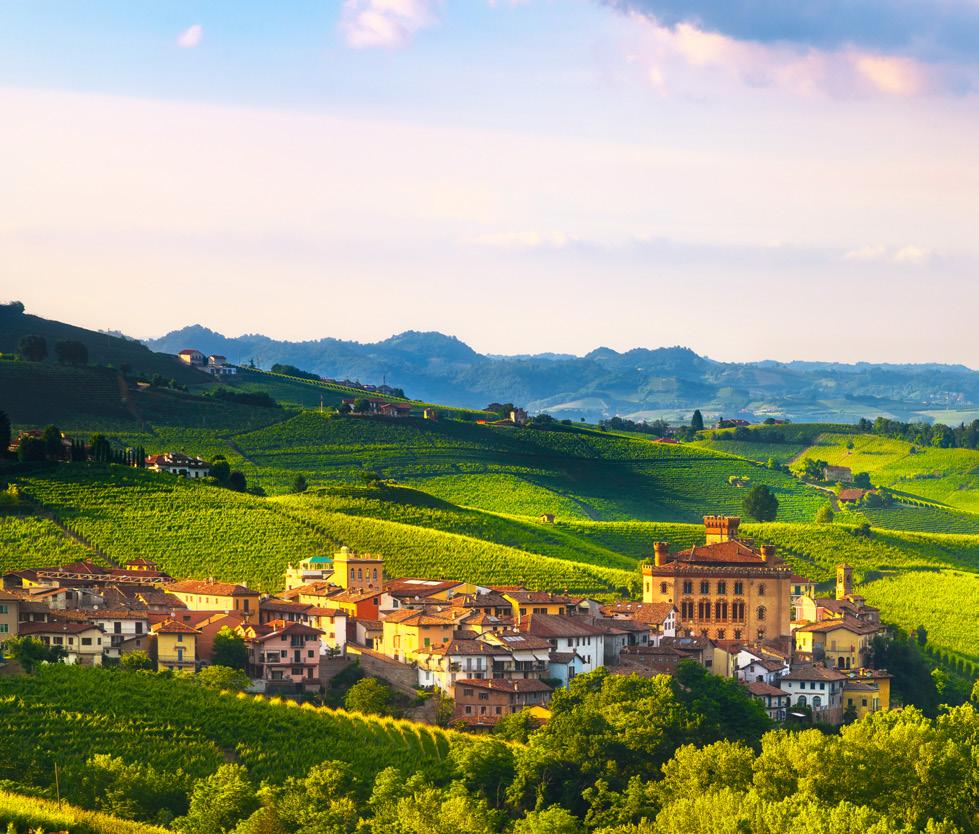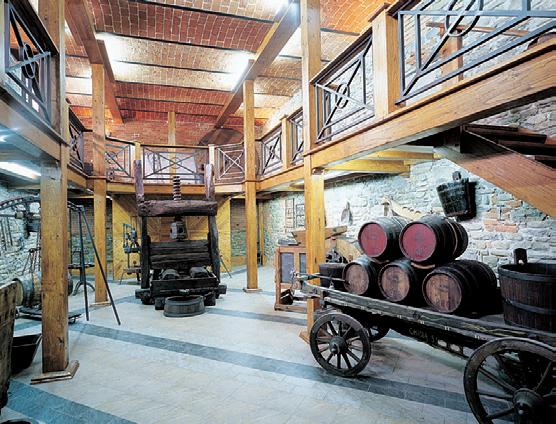
6 minute read
Top destinations around Piedmont
Avant-garde wineries, a legacy of world-class cuisine and marvelous landscapes. All of these things have earned the areas of the Langhe, Roero and Monferrato UNESCO World Heritage status, resulting in an elite tourist destination.
BY CHIARA ZACCARELLI
Advertisement
This is UNESCO’s official reason for adding the wine-growing regions of the Langhe-Roero and Monferrato to its world heritage list in 2014. “An exceptional living testimony to the historical tradition of grape growing and winemaking processes, of a social context, and a rural economy based on viticulture. The vineyards of the Langhe-Roero and Monferrato are an outstanding example of man’s interaction with his natural surroundings.” This area is protected as a ‘cultural heritage’ which is symbolic, because man has managed to shape it, giving it the unique characteristics that it boasts today. In this area, the vineyards of several of the world’s most famous wines, including Barolo, Barbaresco, Asti Spumante and Barbera, stretch as far as the eye can see, in a display of changing colours and softly rolling hills. Although geographically the Langhe, Roero and Monferrato are neighbouring regions, they all have different morphologies, and cultural characteristics. The region’s varied landscape provides fertile soil for an impressive array of local specialties: from superlative wine, to the prized white truffles of Alba, porcini mushrooms and IGP hazelnuts. Located just an hour’s drive from Turin, these regions can be accessed by car (several of the larger centres can also be reached by train). Other options include one of the many organized wine and tasting tours on offer. Ask your concierge.
THE LANGHE
The Langhe are situated between the Tanaro River and Liguria, between the provinces of Asti and Cuneo. Particularly noteworthy among the area’s many tourist attractions
Grinzane Cavour castle and village

© STEVANZZ/SHUTTERSTOCK.COM
are its numerous castles, including that of Grinzane Cavour. Built in the 13th century and currently home to the headquarters of the ‘Cavour Regional Enoteca’, the castle, in addition to stocking several of the region’s finest Doc and Docg wines, also hosts the interesting Langhe Museum (www.castellogrinzane.com). Other mustsees include the Castle of Barolo and its surrounding town, which gives its name to the most famous Italian red wine and is thought to date back to mediaeval times. The town is home to WiMu, a unique wine museum that takes visitors on an immersive journey through the history of viticulture via light, film and installations. The museum is set over three floors of the village’s stunning medieval castle, and the tour includes a visit to the building’s panoramic terrace and its ancient wine cellars (www.wimubarolo.it). After visiting the museum in Barolo, stop in the village of La Morra, better known as ‘the terrace of the Langhe’ thanks to its spectacular views, and head to Massimo Camia’s starred restaurant for a fabulous gourmet meal (www.massimocamia.it). In addition to other specialties, the area is renowned for its famous three-lobed hazelnut, boasting ‘Protected Geographical Indication’ status and used to make various sweet treats. If you want to purchase these tantalizing specialties and see how they’re made, visit Giovanni Cogno’s artisanal workshop (www.giovannicogno.it). Lastly, an absolute ‘must’ for lovers of medieval history and architecture is a visit to the Castle of Serralunga d’Alba, a beautifully preserved Gothic stronghold (www. castellodiserralunga.it). After the long walk up to the castle, take a break and treat yourself to a delicious gourmet meal at the Da Guido restaurant located in the nature reserve of Fontanafredda (www.guidoristorante.it).
MONFERRATO
Stretching southwards, as far as the foot of the Ligurian Appenines, the Monferrato area occupies a fertile tract of terrain between the provinces of Alessandria and Asti. In addition to numerous historic, cultural and outdoor activities, Monferrato is renowned for its gastronomic specialties. Nature, culture, art and religion combine in a walk that takes visitors on a journey to discover the Nature Park of the Sacro Monte di Crea, in the province of Alessandria, a real feat of architectural design that encompasses Mount Crea and its sanctuary, which in turn, is a UNESCO World Heritage site. If you prefer a historical visit to an excursion, don’t miss
the Eco Museum of ‘Pietra da Cantone’ – a type of sandstone only found in this area – in Cella Monte. For some years now, the museum has undertaken the arduous but worthwhile task of taking an inventory of the ‘infernot’ in the area. ’Infernot’ are dark, airless underground spaces, carved out in stone, located beneath houses and cellars that, in some instances, are real underground tunnels. These works of arts, carved and modeled by artists, were either used to store bottles of wine, or as pantries, because the temperature inside them remains constant. Several of these old ‘infernot’ are open for public viewing, especially during the ‘vendemmia’ (grape harvest) or on special occasions (www. ecomuseopietracantoni.it). Although the majority of local wines are red and full-bodied, like Barbera, Grignolino and Freisa, you’ll also find a good selection of whites, including Moscato. An absolute ‘must’ for wine connoisseurs visiting the area is the Enoteca Regionale di Vignale Monferrato. Located in a magnificent 17th century ‘palazzo’, the Enoteca is a great place to taste and purchase some of the area’s best local wines (www. enotecadelmonferrato.it).

ROERO
Roero is situated in the northeastern part of the province of Cuneo, to the left of the Tanaro river. Like the neighbouring Langhe, this area is renowned for its enogastronomic and cultural offerings. Among its castles, the Castle of Govone is particularly noteworthy. The castle is located in the province of Cuneo and was formerly one of the royal residences of the House of Savoy (www.castellorealedigovone.it). Located just a short distance from Alba, the Castle of Monticello is one of the most imposing and best-preserved medieval buildings in the area owing to the fact that since 1372 it has been owned and inhabited by the Roero family of Monticello (www.roerodimonticello.it). Experience what it feels like to be a prince or princess for one night and stay at the Castle of Guarene, an important stopover on the Piedmontese Baroque itinerary which also hosts a hotel belonging to the Relais&Châteaux chain (www.castellodiguarene.com). For real foodies, an absolute must is the famous sausage of Bra, a delectable product made from lean beef and bacon. Since it requires hardly any ageing, it’s eaten fresh year-round and traditionally served raw, usually as an antipasto, or cooked in a sauce that is used to dress ‘tajarin’ (typically fresh Piedmontese pasta) or polenta (www. salsicciadibra.it).
Serralunga d’Alba castle
Museo Enologico Toso
Only a few kilometers from Bra, a trip to the architectural complex of the Agenzia di Pollenzo is well worth your time. Built in 1833, it now hosts the first University of Gastronomic Sciences in the world. This university was founded and promoted by the international Slow Food association, which studies, protects and disseminates the agricultural and enogastromic traditions of countries worldwide (www. agenziadipollenzo.com).

© MIKEDOTTA | DREAMSTIME.COM








